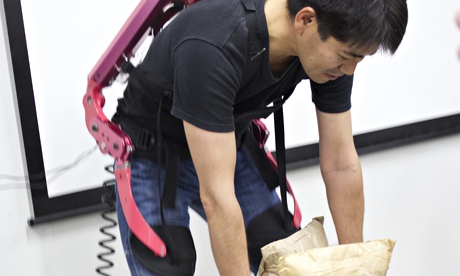With a bend of the knees and a hiss of compressed air being pumped into his "muscles", Hiroshi Kobayashi lifts two 10kg (22lb) sacks of rice with as much ease as if they had been regular-size bags of sugar.
Kobayashi is cheating, but with honourable intentions. Almost three decades after Sigourney Weaver's power loader made short work of heavy lifting in Aliens, he is the brains behind a new generation of "muscle suits" specially designed for Japan's rising number of elderly citizens, and their care workers. "The idea is to help people live independently and self-sufficiently," said Kobayashi, a professor at Tokyo University of Science who has been perfecting the prototype device for more than a decade.
"The joints are moved by artificial muscles, so the wearer is able to move about unencumbered. There is zero risk to the wearer, even if it malfunctions."
Kobayashi's 5kg muscle suit, which goes on sale next month, is expected to be adopted first by manual and agricultural workers, who are prone to lower back pain, as well as employees at daycare and retirement homes.
As the suits become more sophisticated and affordable, Kobayashi and his collaborators at the die maker Kikuchi Seisakusho predict they will be in common use among disabled and elderly people with mobility problems, possibly by the end of this decade.
The muscle suit has earned good reviews where it has been trialled – not least from care workers who had been forced to take time off with back problems brought on by, among other tasks, lifting residents into and out of baths. "In the past when workers lifted people, they had to really exert themselves, which also had the effect of causing anxiety among the elderly people they were caring for," Kobayashi said. "The muscle suit makes lifting so much easier, and the people being cared for don't have to worry about being dropped."
Kikuchi Seisakusho's factory in Fukushima prefecture is expected to manufacture up to 200 muscle suits a month, starting this summer. Initially, the suits will be rented out for about 25,000 yen (£146) a month, with a smaller number being sold for ¥300,000-¥800,000, the firm's president, Isao Kikuchi, said.
"It's very rare that a piece of equipment like this is made commercially available," he added. "The elderly care and medical markets are only going to get bigger, so we want to make the most of the opportunity.
Tokyo University of Science and Kikuchi Seisakusho are not alone in trying to develop affordable, fully functional exoskeletons. Cyberdyne, based near Tokyo, has had some success with its Hybrid Assistive Limb [HAL] robotic suit, which it rents out to hospitals and care facilities, including several in Europe. And Japan's government is offering subsidies to encourage engineers to develop even more sophisticated robotics for the medical and elderly care markets.
The care robotics industry alone will be worth ¥35bn (£200m) by the end of the decade, according to a study by Yano Research Institute.
"I don't think anyone else is doing what we're doing with the muscle suit," Kobayashi said. "No other suit can be worn with this much ease that also enables its wearer to pick up something weighing as much as 30kg. The US military has something similar, but even that's not as easy to use as ours, which takes 10 seconds to put on."
In the coming years, the suits could be common sights in places such as JC Group's facility, a once-vacant traditional-style house that has been converted into a care home for the elderly as the country attempts to ease the social and financial strain of supporting its greying population. The house, in Koganei, western Tokyo, is part of a shift towards smaller care facilities for the elderly as traditional nursing homes struggle to cope with the 520,000 people on waiting lists for specialised care.
"I entered this market seven years ago and already we have almost 800 facilities throughout Japan," said JC Group's chairman, Hideaki Fujita. "You only have to look around to see how much demand there is, particularly among elderly people with Alzheimer's."
Japan will feel the pressure of its ageing population even more keenly in the decades to come.
Almost 5.4 million of its 31 million-strong population of over-64s need assistance with daily activities, according to the health and welfare ministry. The average life expectancy of Japanese men exceeded 80 years for the first time last year, according to government figures, while the country's women retained their place at the top of the global longevity rankings with a record average life expectancy of 86.6 years.
"I've come across countless families who can't cope with the demands of looking after an elderly relative," said Fujita, whose Koganei facility can accommodate 10 elderly people during the day and up to five overnight.
"In the end, the stress becomes too much for them and they go to pieces. But here, they know that elderly members of their family are being looked after somewhere that isn't much different from their own homes.
"We keep numbers low so that users quickly get to know each other and the members of staff. It gives everyone peace of mind."










